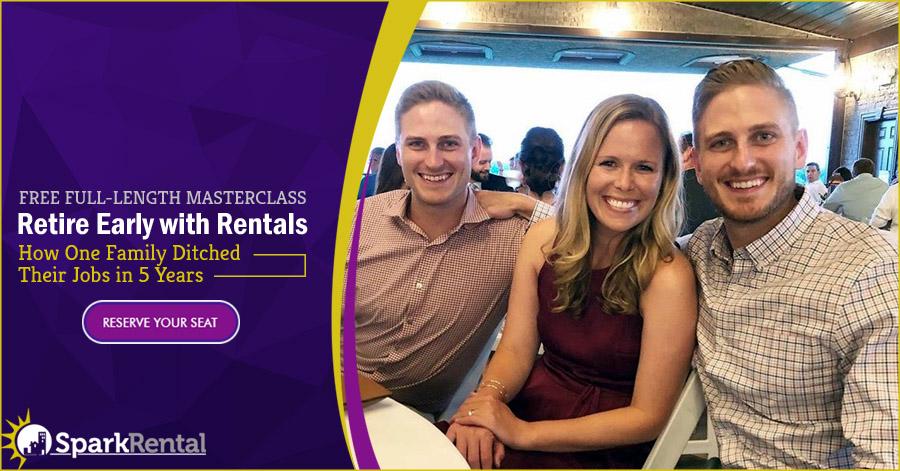
How quickly could you reach financial independence, if you could live on half your income and invest the rest? When would you be able to retire, with that change in the math?
Probably within five years, and almost certainly under ten.
Remember, financial independence and retirement are not about how much you earn. Financial independence is about how much of your expenses you can replace with income from your investments (passive income).
There are two ways to speed that process up: lowering your expenses, and increasing your passive income. The good news is these are both accomplished by the same process: dropping the percentage of your income that you live on, so that the remaining percentage can be invested to generate more passive income.
At SparkRental, we focus primarily on passive income from rentals, but a balanced investment portfolio includes securities as well. Mutual funds, ETFs, perhaps individual stocks. Even bonds, although they tend to perform poorly in the low-interest rate environment we’ve seen in this century.
Here’s our challenge to you: assume for a moment that it is possible to live on half your income. Suspend disbelief. What kinds of financial moves and budget hacks would it take to get there?
1. Your New Budget: Two Weeks’ Take-Home Pay
We’ve been through this before, but when creating a monthly budget, you can only count on four weeks’ income. Occasionally you’ll get a bonus paycheck, but in most months, you’ll only receive paychecks for four weeks’ work.
If you’re paid biweekly, that means you can count on receiving two paychecks in a given month. So, your challenge is how to live on one paycheck.
One paycheck’s worth of money. After taxes. That’s your budget.
Seem impossible? Well, what would happen if you were fired tomorrow, spent the next eight months unemployed, and eventually found a job earning half the income? Would you starve? Be out on the street?
No, you’d simply pare down your expenses, and move on. In other words, it is absolutely, 100% possible, it just requires some lifestyle changes.
You have a target budget: one paycheck’s worth of take-home pay. Now, write out a list of all your fixed monthly expenses: housing, car payment, fixed utility bills, any other debt payments. Then write out your variable monthly expenses: usage-based utility bills, gas for your car, groceries, and so on. Lastly, write out annual or semi-annual recurring expenses, such as insurance, accountant costs, birthday gifts, holiday gifts, average annual cost of wedding gifts, etc.
You’re probably in the red by now. And you haven’t even gotten to entertainment expenses yet!
Don’t despair – you now have a framework to start reassembling.
2. Reduce or Eliminate Your Housing Cost by House Hacking
Housing is the largest expense for most people, so it’s the first expense that needs scrutiny. Lucky for you, it doesn’t have to mean moving into a hovel on the distant outskirts of civilization.
If you house hack properly, your renters can pay your entire housing costs. The classic example is buying a small multi-unit property, moving into one of the units, and leasing out the other unit(s). If you haven’t already, read this house hacking case study on how a regular guy with no real estate investing experience now lives for free. (Seriously – it’s awesome, and easier than you think.)
Don’t want to buy a new home and move? You still have options. You could segment part of your property as an income suite, and lease it out. It could be on Airbnb, or you could sign a long-term lease agreement and have a renter move into the suite.
Or you could not bother with a separate income suite at all, and just bring in a housemate. Housemates come with some surprising advantages beyond their rent: they take over many of the household chores, you can alternate cooking meals with them, they pay a portion of the utility bills. They can even become close friends – my old housemate is one of my best friends to this day!
Use this house hacking calculator to help you determine how much of your housing payment you can cover, through different types of house hacking.
3. Snowball Your Personal Debts
Have personal debts, beyond your mortgage and/or car loan? Most personal loans are unsecured, and unsecured loans tend to be expensive. They’re dead weight on your budget.
If you have credit card debt or other personal loans with interest rates over 6%, you need to get rid of them before you can start earning passive income from investments. Start with your highest-interest debt, and put half of your paycheck toward it.
When that debt is paid in full, take all of the money you had been putting toward it and pay down your next highest-interest debt. Each time you pay off a debt, it will leave more money in your budget to pay down the next debt.
Once you’ve paid off all debts with interest rates over 6%, you’ll be in far better position to start investing in income-producing assets (e.g. rental properties, dividend-paying mutual funds, etc.).
4. Learn to Cook
Before going any further, pause and pull out your credit card and bank statements from last month. Add up every expense you had from meals you paid someone else to prepare.
If you’re like most people, you’ll be shocked at the total sum.
I like a nice meal out as much as the next guy, but meals out are budget-killers. They are a luxury.
I didn’t really start learning to cook until I got married. As I’ve become more comfortable in the kitchen, I find myself cooking more and more often. It doesn’t hurt that my meals now actually taste good, but cooking has also become fun for me.
Anyone can cook, and once you get over the initial awkwardness, you’ll find that you can whip up a three-course meal to rival anything at the overpriced downtown restaurant. But it will cost you a sixth of the price, and you can even make extra for next-day leftovers.
As a side bonus, your own cooking will be far healthier than restaurant fare. You can choose low-fat or low-carb ingredients and dishes, while restaurants only prioritize taste.
My challenge to you: live on a food budget of $1 per day. Don’t think it’s possible? Follow these steps from Grocery Coupon Guide to eat well on $1/day.
5. Move Your Social Life Away from Commercial Venues
Where do you meet your friends? Restaurants? Bars? Movie theaters?
Now that you can cook, invite them over for a dinner party. Instead of meeting a bar, take a cooler of drinks somewhere with a nice view. Rather than overpaying for a movie ticket, schedule a movie night at someone’s home.
You could spend $100 out at restaurant or bar with your friends, or you could spend $15 getting together for a beach bonfire. Or a picnic. Or a backyard BBQ. Or a home wine tasting.
It takes a little more creativity and a little more planning, but it will save a massive amount of money, with no loss in fun or time with your friends.
And parents can save even more money, by skipping babysitter costs. Their kids can join them and have their own fun nearby, away from the frowning faces of other patrons at a restaurant or bar.
(article continues below)
6. Earn More Money
Still struggling to make ends meet on your two weeks’ take-home pay? Earn some more money!
There are many ways to earn more. You could negotiate a raise at your current job, or you could start hunting for a new job that pays better. Find out what would make you a more valuable employee, and then do it.
If that’s not possible right now, you could take on a part-time job to earn some extra money. Or better yet, start a side gig!
What skills do you have, that others need? Can you build websites on WordPress? Do you have home improvement experience? Are you a good photographer, and willing to work weddings a few Saturday evenings/month?
Everyone has skills, and more importantly, everyone can learn and develop new skills. There’s always a way to earn more money, but it will take some initiative on your part.
7. Commit: Automatically Transfer Half Your Paycheck
As long as there’s money in your checking/operating account, you’ll be tempted to spend it.
Set up an automatic transfer from your checking account (or wherever your paycheck is deposited) to your savings or investment account. This transfer should take place on the same day you get paid.
In the beginning, you can use this other half of your income to pay off your highest-interest debts, using the snowball method outlined above. Once these expensive debts are paid off, your budget will be that much easier.
With no high-interest debts, you can start investing in high-yield investments that pay you. Your income will start rising, and you’ll enter a virtuous cycle of ever-increasing income.
But that cycle only takes off if you can keep your expenses low. When most people start earning more money, the first thing they do is go out spend more. A new car, a new house, new clothes, fancy dinners out. It’s called lifestyle inflation, and it’s the mortal enemy of financial independence.
Pay yourself first, by transferring your savings/investment budget immediately on each payday. Use it to pay off your high-interest debts, and then the real fun of passive income can begin!
Push Your Mental Boundaries
When you set a “big, hairy, audacious goal” as Jim Collins puts it in his business classic Good to Great, it forces you to shift your mindset beyond your preconceived limitations. You can open your mind to look for what it would take to truly achieve great things. Your mindset shifts from “That’s impossible,” to “What steps would it take to get there?”
That initial suspension of disbelief is critical. If you believe a task is impossible, then it is. Want a simple illustration? If I asked you if a teacher could reach financial independence within six years of graduating, all while traveling the world, you would almost certainly say “No.”
Except it happened. No inheritances. No lottery tickets. Just financial discipline. Ashley Thompson is 28 years old, financially independent, and preparing to retire by 30. She simply lives on a fraction of her income and invests the rest in rental properties. She’s even gotten to travel the world in the meantime!
Our biggest limitations are in our minds. If you want to reach financial independence within a few years, you can do it. Start by working backwards with your budget, look for ways to cut your expenses down and boost your income up. With some creativity and discipline, it is 100% possible to live on half your income.
What have you done to cut your expenses and boost your savings and investments? Have any tips and tricks to share with other readers? Don’t be shy, we’re aiming for the same goal of financial independence!
























Cool concept. Definitely not an easy thing to accomplish, but then again, neither is financial independence. I like the emphasis on setting wildly ambitious goals and then setting out to find the “how.”
If you start with a “why” that’s extremely meaningful and important to you, you’d be surprised at your ability to find the “how” once you commit!
My first thought was “I want some of whatever Brian’s smoking.” But if you’re not willing to dream big, what’s the point of dreaming, right? And I will say, after reading that Ashley Thompson story, I can see that it IS possible… if you’re willing to live a crazy frugal lifestyle.
Haha, I was this close to making a lame “I’m high on life” joke. But hey, financial independence is a matter of priorities, right? People can retire in a matter of a few years, if they’re willing to take extraordinary measures to get there. Most people are content to coast though 🙂
I like the audacity, but I only make around $35K/year. Hard to imagine living any kind of life worth living on $17,500/year. That’s like poverty level living!
I spent a year or two living under $20,000/year, and rather comfortably. I had a housemate, a home with low rent, drove an inexpensive used car, made a lot of meals, etc. But before you ask, no I didn’t have children. I also didn’t have a spouse to help me though, either, so maybe that balances it out? But I would propose that house hacking really can enable anyone to live on half their income, if they do it right!
Get your family down to one car, and make it a cheap used car. Use public transportation, bikes, etc.
Absolutely! Along similar lines, I believe it was Mr. Money Mustache who said “Bikes save you money and run on fat. Cars cost you money and make you fat.” (or something to that effect)
Let’s aim for financial independence this 2022. Let’s go!
Amen Jack!